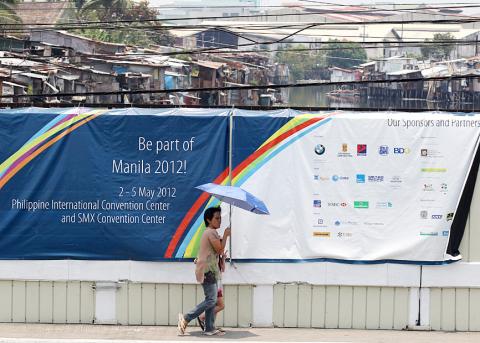Delegates attending an international conference in the Philippine capital might not see what they came to discuss: abject poverty.
A makeshift, temporary wall has been erected across a bridge on a road from the airport to downtown Manila that hides a sprawling slum along a garbage-strewn creek.
Presidential spokesman Ricky Carandang defended the wall’s installation, saying yesterday “any country will do a little fixing up before a guest comes.”

Photo: EPA
He expressed hope that this week’s annual meeting of the Asian Development Bank (ADB) Board of Governors, which includes finance ministers and senior officials from 67 member states, will show the Philippines is open for business. The lending institution, which is headquartered in its own walled compound in Manila, aims to cut poverty in the Asia-Pacific region.
“We need to show our visitors that Metro Manila is orderly. We owe it to ourselves,” Metro Manila chief Francis Tolentino said. “I see nothing wrong with beautifying our surroundings. We are not trying to keep the poor out of the picture.”
There was no immediate comment from ADB.
The Philippine Communist Party recalled that former Philippine first lady Imelda Marcos — notorious for living an ostentatious lifestyle — was ridiculed for trying to hide squatter colonies. She erected similar whitewashed walls along the route of foreign visitors to the Miss Universe pageant in Manila in 1974, and other international events.
“The government should face reality. If they don’t, how will they know the problem, how will they solve the problem?” asked Renato Reyes, secretary general of the largest left-wing group Bayan. “By covering the truth, they lose the energy or intention to resolve the problem.”
About a third of Manila’s 12 million residents live in slums, and a third of 94 million Filipinos live below the poverty line of US$1.25 a day. Overall, more than half the population in Asia remains poor.

BACKLASH: The National Party quit its decades-long partnership with the Liberal Party after their election loss to center-left Labor, which won a historic third term Australia’s National Party has split from its conservative coalition partner of more than 60 years, the Liberal Party, citing policy differences over renewable energy and after a resounding loss at a national election this month. “Its time to have a break,” Nationals leader David Littleproud told reporters yesterday. The split shows the pressure on Australia’s conservative parties after Prime Minister Anthony Albanese’s center-left Labor party won a historic second term in the May 3 election, powered by a voter backlash against US President Donald Trump’s policies. Under the long-standing partnership in state and federal politics, the Liberal and National coalition had shared power

CONTROVERSY: During the performance of Israel’s entrant Yuval Raphael’s song ‘New Day Will Rise,’ loud whistles were heard and two people tried to get on stage Austria’s JJ yesterday won the Eurovision Song Contest, with his operatic song Wasted Love triumphing at the world’s biggest live music television event. After votes from national juries around Europe and viewers from across the continent and beyond, JJ gave Austria its first victory since bearded drag performer Conchita Wurst’s 2014 triumph. After the nail-biting drama as the votes were revealed running into yesterday morning, Austria finished with 436 points, ahead of Israel — whose participation drew protests — on 357 and Estonia on 356. “Thank you to you, Europe, for making my dreams come true,” 24-year-old countertenor JJ, whose

A documentary whose main subject, 25-year-old photojournalist Fatima Hassouna, was killed in an Israeli airstrike in Gaza weeks before it premiered at Cannes stunned viewers into silence at the festival on Thursday. As the cinema lights came back on, filmmaker Sepideh Farsi held up an image of the young Palestinian woman killed with younger siblings on April 16, and encouraged the audience to stand up and clap to pay tribute. “To kill a child, to kill a photographer is unacceptable,” Farsi said. “There are still children to save. It must be done fast,” the exiled Iranian filmmaker added. With Israel

Africa has established the continent’s first space agency to boost Earth observation and data sharing at a time when a more hostile global context is limiting the availability of climate and weather information. The African Space Agency opened its doors last month under the umbrella of the African Union and is headquartered in Cairo. The new organization, which is still being set up and hiring people in key positions, is to coordinate existing national space programs. It aims to improve the continent’s space infrastructure by launching satellites, setting up weather stations and making sure data can be shared across